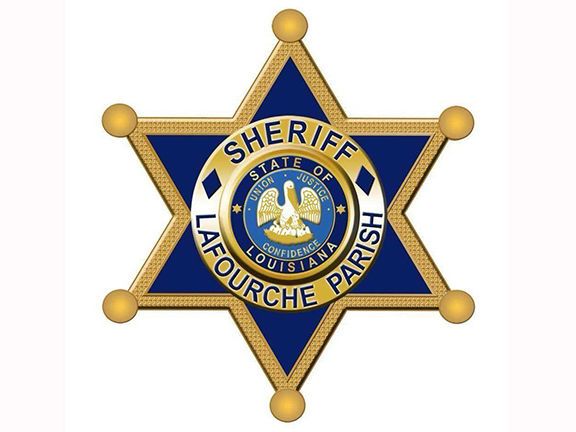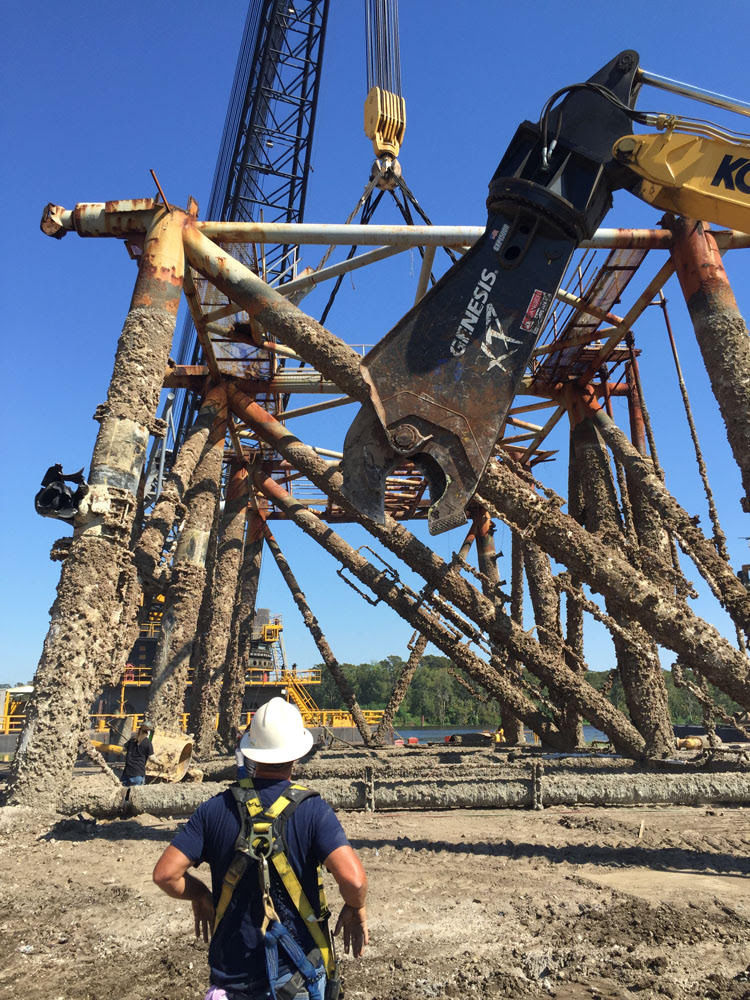
BREAKING: Suspect in custody after chase in south Lafourche
October 17, 2017
Suspect charged with attempted murder in Lafourche high-speed chase, standoff
October 18, 2017A scrapyard that specializes in recycling offshore oil and gas platforms wants to clean and containerize the low-level radioactive waste that occurs from such operations at its Gibson site, then have it shipped out from their yard by a licensed contractor. But Terrebonne Parish Council members have delayed voting on the required permit until more information is presented to the public.
M.A.R.S. Cleaning Services LLC is seeking the permit, and a hearing was held at last week’s Council meeting. But Councilwoman Arlanda Williams asked that the matter be rescheduled.
“A lot of people did not come to the hearing,” Williams said. “They have questions and so do I about whether it is going to affect drinking water. It’s a serious concern as far as how they will work with the water district, and we should have answers before moving forward.”
Toward that end, an informational meeting has been scheduled for 5:30 p.m. Thursday at the Devon Keller Memorial Gym, 5575 Bayou Black Drive in Gibson.
In a parish that lives and dies by oilfield supply and service work, permits for barge and rig dismantling services shouldn’t seem capable of raising an eyebrow.
On the MARS permit application with Louisiana’s Department of Environmental Quality, oilfield produced solids and liquids will be handled at the site. But so will something else.
A special permit is required because MARS will be processing, briefly storing and shipping off NORM – an acronym for Naturally Occurring Radioactive Material.
According to the U.S. Geological Service, NORM includes materials such as uranium, radium, and radon, dissolved in very low concentrations during normal reactions between water and rock or soil. Ground water found with oil deposits can have unusually high concentrations of dissolved materials built up over time.
“Saline, radium-bearing water is unavoidably brought to the earth’s surface with the oil and must be separated and then disposed, usually by return to depth in an injection well,” a USGS fact sheet says. “At some oil-field sites the pipes and tanks that handle large volumes of this ‘produced water’ can become coated with scale deposits that contain radium.”
In the 1980s, when the oil industry and government learned that disposed-of oilfield pipe, certain barges and other waste contained higher-than-acceptable levels of NORM, regulations were promulgated and protocols developed for safe handling, cleaning and disposal of NORM-contaminated materials.
Tony Authement is the manager of the M.A.R.S. facility in Gibson and will be making the company’s presentation Thursday.
NORM material commonly builds up on oilfield pipes and equipment, Authement said, as he explained his company’s current scrapping operation.
MARS checks for radiation levels to determine if NORM exists on pieces of equipment they cut up for recycling, Authement said. If detected, then an outside company must come in, remove the affected pieces, clean them at a different location and then return the cleaned pieces to MARS.
The new component of the operation will see all of that done at the MARS scrapyard, under controlled and confined conditions, Authement said, with all required safeguards in place to prevent contamination of the earth or nearby water.
The company’s plan and all details are contained in more than 300 pages of paperwork filed with the DEQ, which has given its approval. All that remains for operationd to start is the parish permit. The process, according to the state’s paperwork and Authement’s own presentation, begins with a contaminated piece being placed in a special area that is sealed from the rest of the facility. Workers wearing special protective equipment scrub down the piece, and all manner of debris including wastewater is collected. The wastewater is treated for continued use in the special area or containerized with other material. Either way, Authement explained, it is a closed circuit that does not risk contamination of air, water or land.
“Everything is protected and everything is sealed,” Authement said, explaining that any liquid runoff is gathered in sealed containers. They are placed in a special storage area for pickup and disposal by a third party licensed to do so.
“We are not in the disposal or storage business,” said Authement. Drums containing material are picked up by special carriers after each job is completed, he said, because according to the state’s own rules the job is not finished until the disposal is done. “Until that’s done we are unable to invoice our customer for that project.”
The big concern about drinking water, some residents said, is nearby Bayou Black, which is part of the Terrebonne Parish water system.
There is no way under the system being permitted that contaminants can leach into Bayou Black, Authement said, adding that the new operation cuts down on any such risk that might exist now.
“The material is here, no matter what,” Authement said. “The difference is that it would be cleaned and processed here, which gives us greater quality control. I live in Terrebonne Parish, I drink the same water everybody else drinks.”
M.A.R.S. Cleaning Services LLC is owned by Modern American Recycling Services Inc., an Alabama company established in 1971, whose owners reside in Terrebonne Parish. The firm generates $51 million per year in business, according to its public statements. M.A.R.S. Inc. is now the largest barge dismantler in the U.S. and claims to have scrapped an average of 1200 to 1500 barges per year, and handled government demolition contracts since 1985. M.A.R.S.is in the process of obtaining permission to open a site in Denmark to service North Sea operations.
“For us to facilitate operations here once we get approval we will be employing a minimum of eight to fifteen people,” Authement said. “As we grow we will hire more people.”
Once all permits are issued, Authement said, the facility could be operational by early 2018.












